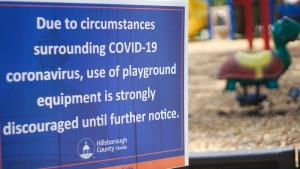
Many of us living in the United States have been social distancing for two full months. My husband and I live in Manhattan, and we’ve basically been confined to our studio apartment since March 15th. Last weekend, I met with a small number family members (who have also been distancing) for the first time. We did not hug and we stood apart from each other. However, I’ll admit that I still felt guilty afterwards.
Across the country, crowds are gathering to protest lockdowns, and some states have announced plans to reopen, despite the number of daily deaths continuing to rise. Social Distance Fatigue has set in for all of us, including myself. However, now is not the time to loosen restrictions – we’re only just getting started. But how can we talk to loved ones who have grown weary of social distancing and encourage them to keep doing the right thing?
Practice Empathy
For many people, particularly the elderly who are especially at risk, loneliness brings its own array of problems. The disappointment of family vacations, reunions, and events being cancelled hits this population especially hard. They may even feel that the benefits of seeing loved ones outweigh the risks for themselves. It’s important to listen and allow loved ones to express these feelings without judgement. Accusations of selfishness and callousness won’t get you anywhere. What you can do is promise to be in touch as often as possible and follow through on that promise.
Argue with Facts, Not Emotions
I’ll admit that I’ve become emotional on several occasions when confronted with false beliefs on the part of loved ones. This hasn’t gotten me anywhere. It’s better to (kindly) offer accurate information and end the conversation. One common misconception, for example, is that COVID-19 is killing the same number of people as the seasonal flu. Rather than declaring that this statistic is wrong and stupid – which is tempting for myself – simply state that COVID-19 has already killed approximately eight times as many people this year as the flu. Additionally, the flu season is coming to an end, while COVID has yet to slow down. If your friend or relative continues to argue, refer them to the CDC and drop the issue. You’re not going to get anywhere by fighting with them.
Set Plans for the Future
Don’t allow hopelessness to settle in. Remind your loved one that, while this will likely take longer than any of us want, it is not permanent. There will be a time in the future when we are able to be together again. If possible, discuss specific things you would like to do in the future. While we aren’t able to set dates just yet, we can promise to follow through on these plans once the crisis has passed.
If Possible, Offer Financial Support
The financial consequences of this pandemic are real and have serious consequences for many people. While I maintain firmly that social distancing is necessary to protect lives, this does not mean that economic concerns are invalid, or that people who are struggling economically aren’t worthy of our concern or sympathy. If you are fortunate enough to still have reliable income, this may be the time to offer financial support to loved ones who need it. If you don’t have family in need of support, there are several nonprofits that are currently working to support families effected by the pandemic. Consider donating a portion of your stimulus check to these organizations.
Stay Firm With Your Own Social Distancing
No matter how much empathy you practice, and how grounded your facts are, some people will still choose not to social distance. It’s an unfortunate fact of life that we cannot control others, including those we love most. When this happens, it’s important to stay firm about your own restrictions. Tell them it’s not a matter of blame or shame, but practicality. If they will not practice social distancing, you will not be able to see them in the near future.
And then follow through on that promise.












